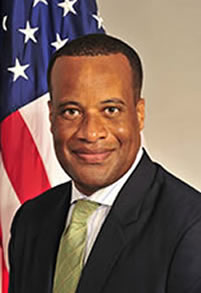December 16, 2016
 Obama administration has taken unprecedented steps to support workforce development and green initiatives and is deeply committed to strengthening America’s workforce and protecting the environment. One such example of this is the Economic Development Administration’s (EDA) recent investment in the Composite Recycling Technology Center (CRTR) based in Port Angeles, Washington.
Obama administration has taken unprecedented steps to support workforce development and green initiatives and is deeply committed to strengthening America’s workforce and protecting the environment. One such example of this is the Economic Development Administration’s (EDA) recent investment in the Composite Recycling Technology Center (CRTR) based in Port Angeles, Washington.
The CRTR pioneers new products using approximately 1.5 million recycled composites (or carbon fiber scrap) that would otherwise end up in landfills. Through the 2016 Regional Innovations Strategies (RIS) Program, EDA has invested $500,000 to support the CRTR’s Recycled Carbon Fiber Innovation Ecosystem Accelerator Implementation Project.
> Read more
December 2016 Newsletter
 When President Lyndon Johnson spoke about creating a “Great Society” – laying the groundwork for the creation of EDA – he called on our country to “create new concepts of cooperation, a creative federalism, between the National Capital and the leaders of local communities.”
When President Lyndon Johnson spoke about creating a “Great Society” – laying the groundwork for the creation of EDA – he called on our country to “create new concepts of cooperation, a creative federalism, between the National Capital and the leaders of local communities.”
No agency within the federal government better embodies this notion than EDA.
At EDA, we have been supporting economically distressed communities for more than 50 years. While EDA does not invest directly in businesses, the agency works closely with local economic development officials to support competitive, bottom up, regionally-owned development strategies focused on stimulating private investment and creating new jobs.
> Read more
December 2016 Newsletter
 Every year, we reflect on the work we’ve accomplished in fostering economic development in communities across the country.
Every year, we reflect on the work we’ve accomplished in fostering economic development in communities across the country.
In 2016, EDA has invested close to $75.9 million in 102 Economic Adjustment Assistance projects and nearly $ 113.9 million in 75 Public Works projects. In total, EDA has invested an estimated $ 277.1 million in approximately 687 projects.
To spotlight economic development efforts across the country, in April, EDA was pleased to host our first National Conference since 2008.
> Read more
December 9, 2016
Blog post by Nathan Ohle, Senior Advisor at the Economic Development Administration and Michigan native
 Domestic workers — nannies, care workers and housekeepers — support families in providing the most basic physical, emotional, and social care needs for their children, elders, and home. They are overwhelmingly women, and predominantly women of color and immigrants, many of whom are undocumented. Despite being critical to the U.S. economy and families, the workforce is among the lowest paid, undervalued, and least supported.
Domestic workers — nannies, care workers and housekeepers — support families in providing the most basic physical, emotional, and social care needs for their children, elders, and home. They are overwhelmingly women, and predominantly women of color and immigrants, many of whom are undocumented. Despite being critical to the U.S. economy and families, the workforce is among the lowest paid, undervalued, and least supported.
With 10,000 people turning 65 every day in the United States and the overwhelming preference of seniors to age in the home, there will be an increasing demand for care and the domestic workforce. Like many other service jobs, they cannot be outsourced or automated. The projected growth of the domestic work labor force means that it is critical that we support these workers, not by training them out of the sector, but by making their jobs quality jobs.
> Read more
December 6, 2016
Guest blog post by Mariana Viturro, Deputy Director of the National Domestic Workers Alliance
Commerce Blog
 Domestic workers — nannies, care workers and housekeepers — support families in providing the most basic physical, emotional, and social care needs for their children, elders, and home. They are overwhelmingly women, and predominantly women of color and immigrants, many of whom are undocumented. Despite being critical to the U.S. economy and families, the workforce is among the lowest paid, undervalued, and least supported.
Domestic workers — nannies, care workers and housekeepers — support families in providing the most basic physical, emotional, and social care needs for their children, elders, and home. They are overwhelmingly women, and predominantly women of color and immigrants, many of whom are undocumented. Despite being critical to the U.S. economy and families, the workforce is among the lowest paid, undervalued, and least supported.
With 10,000 people turning 65 every day in the United States and the overwhelming preference of seniors to age in the home, there will be an increasing demand for care and the domestic workforce. Like many other service jobs, they cannot be outsourced or automated. The projected growth of the domestic work labor force means that it is critical that we support these workers, not by training them out of the sector, but by making their jobs quality jobs.
> Read more
 On November 2, 2016, the city of San Antonio, Texas community leaders and elected officials celebrated the grand opening of the 56,000-square-foot Eastside Education & Training Center (EETC). The facility, which occupies the former Pfeiffer Elementary School, is a one-stop education and workforce development center designed for the Eastside community in partnership with Alamo Colleges and San Antonio Independent School District (SAISD). The EETC is modeled after Alamo Colleges’ highly successful Westside Education & Training Center.
On November 2, 2016, the city of San Antonio, Texas community leaders and elected officials celebrated the grand opening of the 56,000-square-foot Eastside Education & Training Center (EETC). The facility, which occupies the former Pfeiffer Elementary School, is a one-stop education and workforce development center designed for the Eastside community in partnership with Alamo Colleges and San Antonio Independent School District (SAISD). The EETC is modeled after Alamo Colleges’ highly successful Westside Education & Training Center.
The city identified and served as a co-applicant with Alamo Colleges and SAISD to secure a $1.5 million grant from the U.S. Economic Development Administration to renovate the facility. The San Antonio’s Fiscal Year 2017 General Fund budget allocated $100,000 to open and operate the EETC for the next two years.
> Read more
 UpSkill Houston is honored to be a part of the U.S. Department of Commerce and Aspen Institute Communities that Work Partnership. The Houston region focuses on three areas: 1) creating a culture of employer leadership and responsibility; 2) prioritizing key occupations in sectors that drive and support drivers of Houston’s economy; and 3) aligning efforts by education and community organizations that develop the region’s talent pipelines.
UpSkill Houston is honored to be a part of the U.S. Department of Commerce and Aspen Institute Communities that Work Partnership. The Houston region focuses on three areas: 1) creating a culture of employer leadership and responsibility; 2) prioritizing key occupations in sectors that drive and support drivers of Houston’s economy; and 3) aligning efforts by education and community organizations that develop the region’s talent pipelines.
Our region fosters and cultivates leadership to help ensure industry employers lead this work and define the needs, competencies and credentials for success in their respective fields.
For example, leadership from ExxonMobil, Shell, LyondellBasell, Chevron Phillips, Dow, and others focus on the long-term talent pipeline for petrochemical plants. Led by Bellows, Balfour Beatty, S&B, Jacobs, Marek, and others, UpSkill Houston’s Construction sector is developing near- and long-term pipelines of qualified entry-level and incumbent craft professionals for the industry. Employer leadership noticeably engages partners and supports work that aligns with industry needs.
> Read more
 Obama administration has taken unprecedented steps to support workforce development and green initiatives and is deeply committed to strengthening America’s workforce and protecting the environment. One such example of this is the Economic Development Administration’s (EDA) recent investment in the Composite Recycling Technology Center (CRTR) based in Port Angeles, Washington.
Obama administration has taken unprecedented steps to support workforce development and green initiatives and is deeply committed to strengthening America’s workforce and protecting the environment. One such example of this is the Economic Development Administration’s (EDA) recent investment in the Composite Recycling Technology Center (CRTR) based in Port Angeles, Washington. 


 When President Lyndon Johnson spoke about creating a “Great Society” – laying the groundwork for the creation of EDA – he called on our country to “create new concepts of cooperation, a creative federalism, between the National Capital and the leaders of local communities.”
When President Lyndon Johnson spoke about creating a “Great Society” – laying the groundwork for the creation of EDA – he called on our country to “create new concepts of cooperation, a creative federalism, between the National Capital and the leaders of local communities.” Every year, we reflect on the work we’ve accomplished in fostering economic development in communities across the country.
Every year, we reflect on the work we’ve accomplished in fostering economic development in communities across the country. Domestic workers — nannies, care workers and housekeepers — support families in providing the most basic physical, emotional, and social care needs for their children, elders, and home. They are overwhelmingly women, and predominantly women of color and immigrants, many of whom are undocumented. Despite being critical to the U.S. economy and families, the workforce is among the lowest paid, undervalued, and least supported.
Domestic workers — nannies, care workers and housekeepers — support families in providing the most basic physical, emotional, and social care needs for their children, elders, and home. They are overwhelmingly women, and predominantly women of color and immigrants, many of whom are undocumented. Despite being critical to the U.S. economy and families, the workforce is among the lowest paid, undervalued, and least supported. Domestic workers — nannies, care workers and housekeepers — support families in providing the most basic physical, emotional, and social care needs for their children, elders, and home. They are overwhelmingly women, and predominantly women of color and immigrants, many of whom are undocumented. Despite being critical to the U.S. economy and families, the workforce is among the lowest paid, undervalued, and least supported.
Domestic workers — nannies, care workers and housekeepers — support families in providing the most basic physical, emotional, and social care needs for their children, elders, and home. They are overwhelmingly women, and predominantly women of color and immigrants, many of whom are undocumented. Despite being critical to the U.S. economy and families, the workforce is among the lowest paid, undervalued, and least supported. On November 2, 2016, the city of San Antonio, Texas community leaders and elected officials celebrated the grand opening of the 56,000-square-foot Eastside Education & Training Center (EETC). The facility, which occupies the former Pfeiffer Elementary School, is a one-stop education and workforce development center designed for the Eastside community in partnership with Alamo Colleges and San Antonio Independent School District (SAISD). The EETC is modeled after Alamo Colleges’ highly successful Westside Education & Training Center.
On November 2, 2016, the city of San Antonio, Texas community leaders and elected officials celebrated the grand opening of the 56,000-square-foot Eastside Education & Training Center (EETC). The facility, which occupies the former Pfeiffer Elementary School, is a one-stop education and workforce development center designed for the Eastside community in partnership with Alamo Colleges and San Antonio Independent School District (SAISD). The EETC is modeled after Alamo Colleges’ highly successful Westside Education & Training Center.